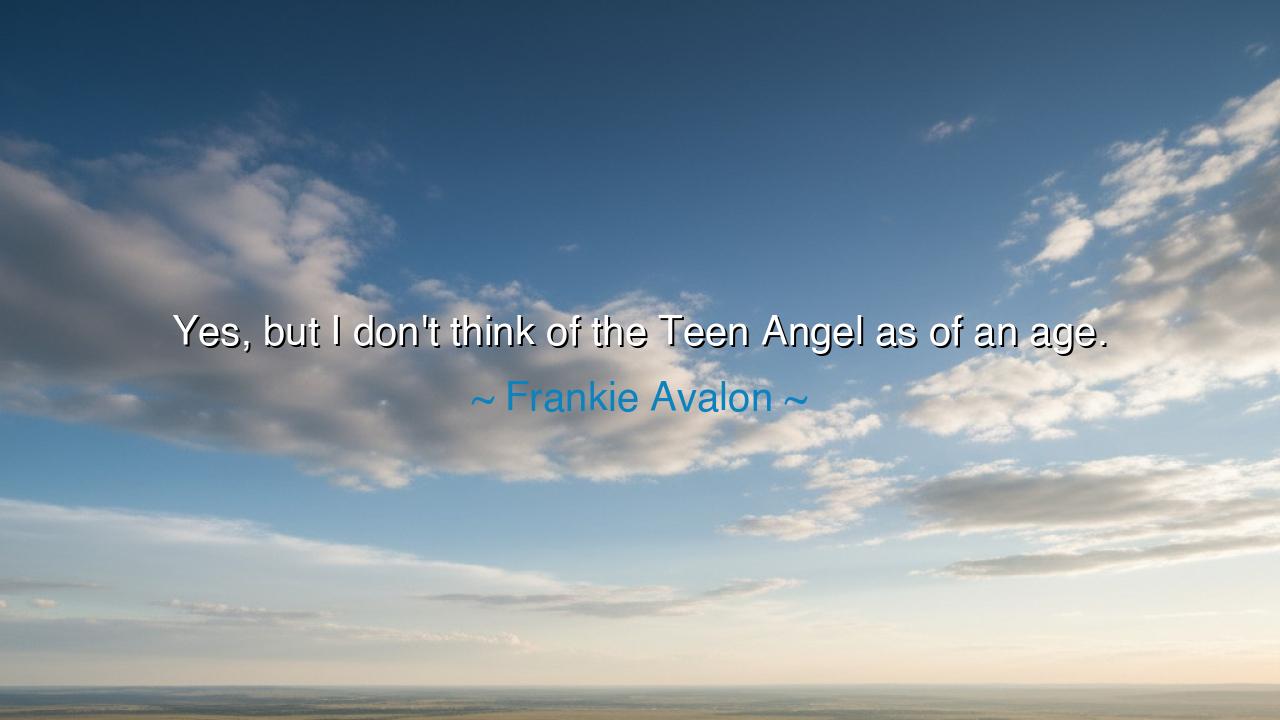
Yes, but I don't think of the Teen Angel as of an age.






Hearken, children of the ages, to the words of Frankie Avalon, who speaks of a figure both temporal and eternal: “Yes, but I don't think of the Teen Angel as of an age.” In these words lies a meditation on the timelessness of spirit, the power of imagination, and the transcendent nature of art. Avalon’s insight reminds us that creations, though often labeled by youth or context, may embody qualities beyond the constraints of years, reflecting ideals, emotions, and longings that endure across generations.
The origin of this reflection lies in Avalon's experience with the song Teen Angel, a ballad of love, loss, and nostalgia. Though the title invokes youth, Avalon perceives the figure not merely as a teenager, but as an emblem of purity, emotion, and the fleeting intensity of human feeling. In this, the song transcends its nominal category: it becomes a vessel for exploring universal experiences of longing, devotion, and the poignancy of impermanence.
Consider the wisdom of the ancients, who often emphasized that the essence of things surpasses the limits of time and label. Plato spoke of forms, eternal and immutable, which exist beyond the mutable world of appearances. Avalon’s Teen Angel, though framed as a youthful figure, occupies a similar realm: it is not bound by age, but by the intensity of feeling and the resonance of experience. The song captures the human heart in its vulnerability and devotion, qualities that are eternal rather than chronological.
History provides vivid parallels. Joan of Arc, though a girl in years, became a figure whose courage, conviction, and vision transcended her youth, inspiring generations far beyond her time. Similarly, the Teen Angel, as Avalon perceives, is more than a teenage character: it is a symbol of innocence, love, and the fragility of existence, qualities that resonate with listeners of every age. In this recognition, Avalon affirms that true art exists not in literal classification, but in emotional and symbolic truth.
This quote also reveals the power of perspective. To view the Teen Angel solely as a young person is to limit the meaning of the song; to see it as timeless and archetypal is to grasp its full emotional scope. Adolescence becomes a lens, not a boundary: the experiences, passions, and sorrows depicted are universal and enduring, echoing through the hearts of all who listen, whether young or old. Avalon’s insight teaches that art must be understood in its broader resonance, beyond superficial markers of age or form.
From this reflection emerges a lesson of lasting significance: we are called to perceive the essence beyond the label, to look past the constraints of chronology, title, or category, and to attend to the core truths of emotion, courage, and human experience. The Teen Angel becomes a mirror, showing us that the power of feeling, devotion, and memory transcends the literal confines of youth. Through such understanding, we cultivate empathy, insight, and a deeper appreciation of life’s fleeting beauty.
Practical guidance flows from this ancient wisdom. First, train the mind to see beyond superficial labels, seeking the underlying essence of people, art, and experience. Second, cultivate empathy and emotional resonance, recognizing that intensity of feeling is not confined by age. Third, honor the timeless qualities within ourselves and others—love, courage, curiosity, and devotion. Fourth, approach works of art, music, and literature with an eye for universal truths, rather than mere contextual details. Finally, let symbols, archetypes, and stories guide reflection and growth, teaching lessons that endure far beyond the moment.
Thus, let Frankie Avalon’s words echo through the corridors of time: the Teen Angel is not of an age, but of spirit, memory, and heart. In recognizing this, we learn to perceive the eternal in the temporal, to honor the enduring truths of emotion and experience, and to allow art and life to teach us lessons that transcend the confines of chronology. In this, we glimpse the profound wisdom of seeing the essence beyond the surface, and carrying it with reverence through all the seasons of life.






AAdministratorAdministrator
Welcome, honored guests. Please leave a comment, we will respond soon